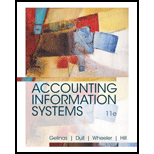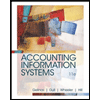
Accounting Information Systems
11th Edition
ISBN: 9781337552127
Author: Ulric J. Gelinas, Richard B. Dull, Patrick Wheeler, Mary Callahan Hill
Publisher: Cengage Learning
expand_more
expand_more
format_list_bulleted
Question
Chapter 4, Problem 5P
Summary Introduction
Narrative summary:
Company G sells consumer products online. The website will consist of front-end web server that helps for the interaction of customer and back-end server. The narrative further explains the activities involved in the process of receiving the order to delivering the order.
To draw: A context diagram.
Introduction:
Expert Solution & Answer
Trending nowThis is a popular solution!

Students have asked these similar questions
Given the following business rules, construct an ER diagram so each rule is captured for the database. Presume each rule is to be treated individually. Construct an ER diagram for each rule.a. A retail sales company prepares sales orders for its customers’ purchases. A customer can make many purchases, but a sales order is written for a single customer.b. A retail sales company orders inventory using a purchase order. An inventory item may be ordered many times, and a purchase order may be created for more than one inventory item.c. A company that sells antique cars prepares a sales order for each car sold. The inventory for this company consists of unique automobiles, and only one of these automobiles may be listed on a sales order.d. A grocery store identifies returning customers via a plastic card that the clerk scans at the time of each purchase. The purpose of this card is to track inventory and to maintain a database of customers and their purchases. Obviously, a customer may…
Sawicki Music Supply is a mail-order business that accepts merchandise orders by telephone and mail. All payments must be prepaid with a major credit card. Once an order is received, either the item is found in inventory and shipped immediately, the item is not found in inventory and is ordered from the manufacturer, or a notice is sent to the customer indicating that the item is no longer stocked. Required Prepare a context, intermediate, and elementary-level data flow diagram for Sawicki Music Supply. For the elementary-level diagram, explode the inventory function.
SpeeDIY Sdn. Bhd. is an online Do-It-Yourself (DIY) store located in Sintok that provides home delivery of DIY products purchased via the Internet. SpeeDIY uses a fully integrated accounting system and practices automated Economic Order Quantity (EOQ) model in managing its inventory. For each registered item in the inventory database, the system specifies quantity on hand and a desired quantity on hand. When the quantity on hand falls below the desired quantity on hand, a notification automatically pops up on the purchasing clerk's computer screen, alerting the clerk to reorder the item. The purchasing clerk can proceed with the reordering of items simply by checking the acceptance box. When the acceptance box is checked, the purchase order transaction file is created. In addition, the vendor is notified electronically through a transmission from the purchasing system. The purchasing clerk prepares a purchase summary report to his manager at the end of the day.
SpeeDIY warehouse has…
Chapter 4 Solutions
Accounting Information Systems
Ch. 4 - Prob. 1RQCh. 4 - Prob. 2RQCh. 4 - Describe each symbol used in constructing DFDs.Ch. 4 - Prob. 4RQCh. 4 - Prob. 5RQCh. 4 - Prob. 6RQCh. 4 - What is a logical DFD?Ch. 4 - Prob. 8RQCh. 4 - When is a set of DFDs balanced (i.e., leveled)?Ch. 4 - Prob. 10RQ
Ch. 4 - Prob. 11RQCh. 4 - Prob. 12RQCh. 4 - Prob. 13RQCh. 4 - Prob. 14RQCh. 4 - Prob. 15RQCh. 4 - Prob. 16RQCh. 4 - How will systems documentation differ between...Ch. 4 - Prob. 1DQCh. 4 - Prob. 2DQCh. 4 - Prob. 3DQCh. 4 - Prob. 1SPCh. 4 - Prob. 2SPCh. 4 - Narrative 1: Freshplace Grocery At Freshplace...Ch. 4 - Prob. 4SPCh. 4 - Narrative 1: Freshplace Grocery At Freshplace...Ch. 4 - Prob. 6SPCh. 4 - Prob. 1PCh. 4 - Prepare a narrative to describe the system...Ch. 4 - Prob. 3PCh. 4 - Narrative 1: Good Buy, Inc (good-buy.com) Good...Ch. 4 - Prob. 5PCh. 4 - Prob. 6PCh. 4 - Narrative 1: Good Buy, Inc (good-buy.com) Good...Ch. 4 - Prob. 8P
Knowledge Booster
Similar questions
- Good Buy, Inc. (good-buy.com) Good Buy, Inc. (a fictitious company) sells a variety of consumer products through its Web site, good-buy.com. Good Buys IT infrastructure consists of a front-end Web server that interacts with customers and a back-end ERP system that manages the inventory and performs other typical ERP functions. The sales order process begins when a customer logs on to the good-buy.com Web site. The Web server requests the current Good Buy online catalog from the ERP system, which sends the catalog to the Web server, and the server displays it to the customer. The customer selects the items and quantities that he wants to purchase; the Web server edits the customer input for accuracy (e.g., ensures that all required fields have been selected or filled in) and sends this list on to the ERP system, where the requested quantities of inventory are allocated for the sale. The ERP sends back to the Web server the quantities that have been allocated, and the Web server displays this information on the customers screen. The customer verifies that the order is correct and completes the sale by entering his shipping and credit card information. The Web server edits this data for accuracy (e.g., ensures that all required fields have been selected or filled in and that the length of the entered credit card number is correct) and sends the credit card information and amount of the sale on to the credit card company. The credit card company sends back a verification number, and the Web server notifies the customer that the sale has been completed by displaying a confirmation number on the customers screen. The Web server also notifies the ERP system that the sale has been completed, and the ERP system changes the status of the inventory from allocated to sold, prints a picking ticket or packing slip in the warehouse, and records (on the enterprise database) a sale and an account receivable from the credit card company. a. Prepare a table of entities and activities for Good Buy, Inc. or CentralRisk Insurance Company. b. Construct a context diagram based on the table you prepared in part (a). Use Microsoft Visio or other diagraming software.arrow_forwardNarrative 1: Good Buy, Inc (good-buy.com) Good Buy, Inc. (a fictitious company) sells a variety of consumer pro-ducts through its Web site, good-buy.com. Good Buy's IT infrastructure consists of a front-end Web server that interacts with customers and a back-end ERP system that manages the inventory and performs other typical ERP functions. The sales order process begins when a customer logs an to the good-buy.00m Web site. The customer requests the company catalog and the Web server obtains the current Good Buy online catalog fmm the ERP system, which sends the catalog to the Web server, and the server displays it to the customer. The customer selects the items and quantities that he or the wants to purchase; the Web server edits the customer input for accuracy (e.g, ensures that all required fields have been selected or frilled in) and sends this list on to the ERP system, where the requested quantities of inventory are allocated for the sale. The ERP sends back to the Web server the quantities that have been allocated, and the Web serverdisplays this information on the customer's semen. The customer verifies that the order is correct and completes the sale by entering his or her shipping and credit card information. The Web server edits this data for accuracy (e.g, enmra that all required fields have been selected or filled in and that the length of the entered credit card number is correct) and sends the credit card information and amount of the sale on to the credit card company. The credit card company sends back a verification number, and the Web server notifies the customer that the sale has been completed by displaying a confirmation number on the customer's screen. The Web server also notifies the ERP system that the sale has been completed, and the ERP system changes the status of the inventory from allocated to sold, prints a pick-ing ticket or packing slip in the warehouse, and records (on the enterprise database) a sale and an account receivable from the credit card company. Use the narrative(s) as selected by your instructor, to prepare a table of entities and activities.arrow_forwardNarrative 1: Good Buy, Inc (good-buy.com) Good Buy, Inc. (a fictitious company) sells a variety of consumer pro-ducts through its Web site, good-buy.com. Good Buy's IT infrastructure consists of a front-end Web server that interacts with customers and a back-end ERP system that manages the inventory and performs other typical ERP functions. The sales order process begins when a customer logs an to the good-buy.00m Web site. The customer requests the company catalog and the Web server obtains the current Good Buy online catalog fmm the ERP system, which sends the catalog to the Web server, and the server displays it to the customer. The customer selects the items and quantities that he or the wants to purchase; the Web server edits the customer input for accuracy (e.g, ensures that all required fields have been selected or frilled in) and sends this list on to the ERP system, where the requested quantities of inventory are allocated for the sale. The ERP sends back to the Web server the quantities that have been allocated, and the Web serverdisplays this information on the customer's semen. The customer verifies that the order is correct and completes the sale by entering his or her shipping and credit card information. The Web server edits this data for accuracy (e.g, enmra that all required fields have been selected or filled in and that the length of the entered credit card number is correct) and sends the credit card information and amount of the sale on to the credit card company. The credit card company sends back a verification number, and the Web server notifies the customer that the sale has been completed by displaying a confirmation number on the customer's screen. The Web server also notifies the ERP system that the sale has been completed, and the ERP system changes the status of the inventory from allocated to sold, prints a picking ticket or packing slip in the warehouse, and records (on the enterprise database) a sale and an account receivable from the credit card company. Use the narrative(s) as selected by your instructor, to prepare a table of entities and activities. Annotate the table of entities and activities to indicate on this table the groupings, bubble numbers, and bubble titles to be used in preparing a level 0 logical DFD. Prepare a logical DFD (level 0 only) based on the table you prepared. If you completed any of the previous problems, use that information to help you construct the diagram. a. Use Microsoft Visio, any other diagramming software or another Microsoft office product such as Excel to create the diagram you drew in SP 4-7.arrow_forward
- SpeeDIY Sdn. Bhd. is an online Do-It-Yourself (DIY) store located in Sintok that provides home delivery of DIY products purchased via the Internet. SpeeDIY uses a fully integrated accounting system and practices automated Economic Order Quantity (EOQ) model in managing its inventory. For each registered item in the inventory database, the system specifies quantity on hand and a desired quantity on hand. When the quantity on hand falls below the desired quantity on hand, a notification automatically pops up on the purchasing clerk's computer screen, alerting the clerk to reorder the item. The purchasing clerk can proceed with the reordering of items simply by checking the acceptance box. When the acceptance box is checked, the purchase order transaction file is created. In addition, the vendor is notified electronically through a transmission from the purchasing system. The purchasing clerk prepares a purchase summary report to his manager at the end of the day. SpeeDIY warehouse has…arrow_forwardOLTP VERSUS OLAP SERVERS For each of the following processes, state whether OLTP or OLAP is appropriate, and why. An order entry system that retrieves customer information, invoice information, and inventory information for local sales. An order entry system that retrieves customer information, invoice information, inventory information, and several years of sales information about both the customer and the inventory items. An order entry system that retrieves customer information, invoice information, inventory information, and information to compare the current sale to sales across several geographic regions. An order entry system that retrieves customer information, invoice information, inventory information, and accounts receivable information for sales within one marketing region. An insurance company requires a system that will allow it to determine total claims by region, whether a relationship exists between claims and meteorological phenomena, and why one region seems to be…arrow_forwardCase analysis 2 FTW corporation sells computer peripherals and related devices, such as printers, ink, flash drives and cables. FTW has a staff of three purchasing agents, each of whom oversees a specific set of inventory items. Each purchasing agent uses his/her discretion in making decisions about when to order inventory, how much inventory to order, and which vendor to purchase from. When ordered inventory arrives at FTW, one of two receiving clerks matches the items, quantities, and vendors against a copy of the purchase order, then either stocks the merchandise on the shelves or puts it in the storeroom. FTW's accountant receives a copy of the invoice from the vendor, as well as an e-mail from one of the receiving clerks indicating that merchandise has been received. The e-mail also includes the relevant purchase order number. The accountant files the invoice by date in a filing cabinet; once a week, the accountant removes invoices from the filing cabinet and pats them by…arrow_forward
- Consider the following short case as you respond to the question:SPC Corporation sells computer security software. They maintain their AIS using general ledger software; data files are backed up twice a day. Sales staff can access the customer database, inventory files and general ledger, as well as sales-related documents such as invoices and sales orders. Newly hired sales staff members at SPC receive the company procedures manual which explains the process used to complete the steps in the sales/collection process. To minimize costs, SPC designates up to five sales staff members each month who can do credit checks for all new customers in addition to processing sales. SPC bills its clients monthly and uses the balance forward method of accounting for receivables; all cash receipts from clients are processed using a lockbox procedure. The lockbox firm's fee is 3% of all collections. SPC's accounting department estimates bad debts at the end of each fiscal year; they are normally…arrow_forwardPrecision Industries, Inc., is a manufacturer of electronic components. When a purchase order is received from a customer, a sales clerk prepares a serially numbered sales order and sends copies to the shipping and accounting departments. When the merchandise is shipped to the customer, the shipping department prepares a serially numbered shipping advice and sends a copy to the accounting department. Upon receipt of the appropriate documents, the accounting department records the sale in the accounting records. All shipments are FOB shipping point. Assume that all shipments for the first five days of the following year were recorded as occurring in the current year. If not corrected, what effect will this cutoff error have upon the financial statements for the current year?arrow_forward1. A clerk in the sales department receives a hard-copy customer order by mail and manually prepares four hard copies of a sales order. This is a typical event in the Group of answer choices b. Expenditure cycle d. Costing cycle a. Revenue cycle c. Conversion cycle 2. Which of these is not a true statement relating to manual and electronic accounting systems? Group of answer choices a. Large businesses integrate their accounting software with their overall computerised information system. b. The accounting principles underlying manual and electronic systems are fundamentally different. c. Computerised systems normally provide more reports, providing greater information to users, than manual systems. d. Most entities today use computerised accounting systems. 3. All of the following are advantages of using subsidiary ledgers, except Group of answer choices a. they make possible a division of labour b. they show all the transactions affecting customers and creditors.…arrow_forward
arrow_back_ios
arrow_forward_ios
Recommended textbooks for you
 Accounting Information SystemsFinanceISBN:9781337552127Author:Ulric J. Gelinas, Richard B. Dull, Patrick Wheeler, Mary Callahan HillPublisher:Cengage Learning
Accounting Information SystemsFinanceISBN:9781337552127Author:Ulric J. Gelinas, Richard B. Dull, Patrick Wheeler, Mary Callahan HillPublisher:Cengage Learning Pkg Acc Infor Systems MS VISIO CDFinanceISBN:9781133935940Author:Ulric J. GelinasPublisher:CENGAGE L
Pkg Acc Infor Systems MS VISIO CDFinanceISBN:9781133935940Author:Ulric J. GelinasPublisher:CENGAGE L Auditing: A Risk Based-Approach to Conducting a Q...AccountingISBN:9781305080577Author:Karla M Johnstone, Audrey A. Gramling, Larry E. RittenbergPublisher:South-Western College Pub
Auditing: A Risk Based-Approach to Conducting a Q...AccountingISBN:9781305080577Author:Karla M Johnstone, Audrey A. Gramling, Larry E. RittenbergPublisher:South-Western College Pub Accounting Information SystemsAccountingISBN:9781337619202Author:Hall, James A.Publisher:Cengage Learning,
Accounting Information SystemsAccountingISBN:9781337619202Author:Hall, James A.Publisher:Cengage Learning, College Accounting, Chapters 1-27AccountingISBN:9781337794756Author:HEINTZ, James A.Publisher:Cengage Learning,
College Accounting, Chapters 1-27AccountingISBN:9781337794756Author:HEINTZ, James A.Publisher:Cengage Learning,

Accounting Information Systems
Finance
ISBN:9781337552127
Author:Ulric J. Gelinas, Richard B. Dull, Patrick Wheeler, Mary Callahan Hill
Publisher:Cengage Learning

Pkg Acc Infor Systems MS VISIO CD
Finance
ISBN:9781133935940
Author:Ulric J. Gelinas
Publisher:CENGAGE L

Auditing: A Risk Based-Approach to Conducting a Q...
Accounting
ISBN:9781305080577
Author:Karla M Johnstone, Audrey A. Gramling, Larry E. Rittenberg
Publisher:South-Western College Pub

Accounting Information Systems
Accounting
ISBN:9781337619202
Author:Hall, James A.
Publisher:Cengage Learning,

College Accounting, Chapters 1-27
Accounting
ISBN:9781337794756
Author:HEINTZ, James A.
Publisher:Cengage Learning,